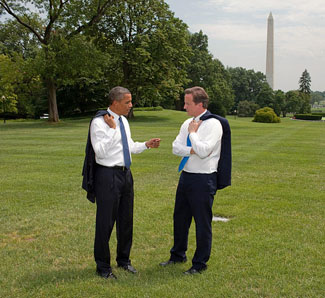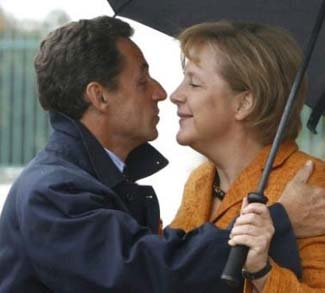G8 leaders are meeting in Northern Ireland against the backdrop of alleged chemical warfare in Syria, simmering protests in Turkey, domestic spying scandals in the United States and the UK, and the election of a more reform-minded president in Iran. Yet the preamble to this latest global pageant concerned none of the above. Instead, it saw the announcement of EU-US free trade talks, or what could be “the biggest trade deal in history” in the words of UK Prime Minister David Cameron, the very same politician who recently promised an in-out referendum on EU membership if his Conservative Party wins in 2015 elections.
Much like the hitherto elusive agreement sought by EU-Canada trade talks, an EU-US free trade deal is a foregone conclusion to many analysts; the only questions being how long negotiations drag on and whether or not the final deal sacrifices some of the golden calves of EU/US protectionism such as the Common Agricultural Policy (CAP) in the EU and public procurement in the United States. And while there are some countries that are sure to hold up negotiations (France) there are several others that are desperate to drum up economic momentum wherever they can get it (Portugal, Italy, Greece, Spain).
Bilateral and regional free trade agreements have been sought out by several developed economies since the Doha round of WTO trade talks broke down. The Trans-Pacific Partnership (TPP), a Pacific region free trade agreement currently being negotiated, stands as another example of the ad hoc approach to economic globalization.
In this context, it’s not altogether surprising that the EU and the United States are pursuing a bilateral trade agreement. What is surprising however is that the negotiations are being trumpeted by David Cameron, who, however tepid in his convictions, is still considered to be somewhat of a Eurosceptic in British politics.
Euroscepticism has been rising dramatically in the UK over the past decade, even before Greek debt levels plunged the euro zone into crisis. Between 2004 and 2012, those who “tend not to trust” the EU have increased from 48% to 80%. Popular attitudes are now being reflected in mainstream politics, as the UK Independence Party (UKIP) has recently come in from the fringe of British politics to pick up 139 seats in local elections in May.
David Cameron responded to the growing political pressure represented by UKIP by announcing his intention to hold an in-out referendum on UK membership at the end of 2017. He has also publically supported a private member’s bill that will effectively stamp the 2017 date into law.
Thus, although Cameron has maintained that he supports remaining in the EU as long as the EU-UK relationship is renegotiated, on the surface it might seem strange that he’s eagerly boasting the benefits of a EU-US trade deal, benefits that are projected to be worth “£100bn to the EU, £80bn to the US, and £85bn to the rest of the world.” But on closer inspection, an EU-US trade deal might be a boon for David Cameron’s domestic political fortunes and the long-term prospects of the UK remaining in the EU as well.
For one there’s the fact that it’s the prime minister of the UK announcing an EU deal, which allows Cameron to bask in some of the light of the fabled US-UK ‘special relationship.’ This implies value on the part of the UK as a sort of political and economic bridge between the United States and the EU, and it might even lend itself to a more amenable ‘renegotiation’ of the UK-EU relationship.
Second there’s the fact that an EU-US deal helps to diversify the UK’s global trade portfolio for as long as it remains in the bloc. One of UKIP’s main arguments against UK membership in the EU is that it chains the country to a declining economy at the expense of other global free trade opportunities. An EU-US deal suggests that the EU is a good vehicle for realizing such opportunities.
Finally there’s the actual economic benefit that would result from the deal, which would not only help to kick start a flagging domestic economy but also serve as political fodder as the 2017 referendum approaches: “Look at what we would be sacrificing if we were to leave the EU.”
Taken together, it looks like David Cameron has accepted the inevitability of an EU referendum in the UK, but he’s committed to giving the ‘yes’ option a fair shake at winning if he gets his way in the ongoing ‘renegotiations.’




